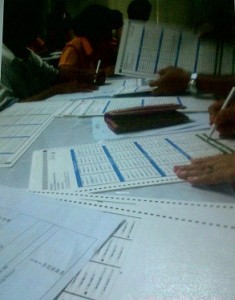By ELLEN TORDESILLAS
 STRANGE things are going on at the National Printing Office which has been given the job to bid out P780 million contract to supply and print 55 million ballots for the May 2013 elections.
STRANGE things are going on at the National Printing Office which has been given the job to bid out P780 million contract to supply and print 55 million ballots for the May 2013 elections.
This will be the Philippines’ second national automated elections.
![]() The 2010 election was not perfect but for a first-time experience, it was a huge success. In less than 24 hours, the nation knew the results of the presidential and vice-presidential race with almost 70 percent of the votes counted. A Social Weather Stations survey showed overwhelming satisfaction (three out of four Filipinos) over the results of the first automated nationwide elections in the country.
The 2010 election was not perfect but for a first-time experience, it was a huge success. In less than 24 hours, the nation knew the results of the presidential and vice-presidential race with almost 70 percent of the votes counted. A Social Weather Stations survey showed overwhelming satisfaction (three out of four Filipinos) over the results of the first automated nationwide elections in the country.
It is disturbing that instead of learning from good practices of the 2010 election and leveling up the preparations for the 2013 elections, some of those involved in the 2013 elections preparations are sliding back which could erase whatever gains that the country has gained in holding credible elections.
In the 2010 elections, the Commission on Elections used precinct count optical scan machines supplied by Smartmatic. The same 82,000 PCOS machines will be used in the 2013 elections. The Supreme Court has upheld the validity of the P1.8 billion contract Comelec has entered with Smartmatic.
In the 2010 elections, Smartmatic and the National Printing Office printed and supplied the ballots used in the PCOS machines.
This year, Comelec deviated from what they did in 2010 of deciding who would print and supply the ballots, and instead gave that job to the NPO.
This is where the problem is.
NPO has awarded the P780 million contract to Holy Family Inc., which is partnering with Canon Marketing Philippines.
Holy Family/Canon got the contract despite submitting a false claim on the bidding requirements and the failure of their sample ballots in the test.
NPO disqualified two other bidders: a joint venture of Advance Computer Forms Inc., ASA Colors and ePDS Inc, a subsidiary of the Philippine Long Distance Telephone Co., and Smartmatic-Total Information Management.
Advance Computers and Smartmatic are contesting their disqualification saying that the way NPO conducted the bidding was blatantly skewed in favor of Holy Family.
Smartmatic said one of the grounds for the disqualification, which is existence of the corporation since 2006, was not a requirement in the checklist provided the bidders.
Another ground for disqualification which applied to both Smartmatic and Advance Computers Forms was failing to meet the single biggest contract requirement. Government procurement rules require all bidders to have done a contract worth as much as 50 percent of the project they are bidding for.
But Smartmatic did the 2010 printing of ballots which was covered by a contract worth about P1 billion?
NPO said the 2010 ballot job of Smartmatic is not a “similar contract” to the one being bidded out. Smartmatic is asking for a reconsideration of NPO’s decision.
But how about Holy Family, the bid winner?
Holy Family said that it had a P120 million project with the Maritime Industry Authority for the printing of Seafarer’s Identification and Record Book and a P60 million contract with NPO for the barangay elections.
But MARINA Officer –in-charge Roberto C. Arceo, in response to a query by Smartmatic, said in a Sept. 14, 2012 letter that “based on the records of the Office, the Marina had never transacted with a certain Holy Family Printing to print the SIRB considering that the MARINA only procures from Recognized Government Printers (RGPs) such as NPO, to print our SIRB. Furthermore, our annual budget in procuring SIRBs ranges from P30 to P35 Million per year, hence, there were no contracts awarded to any RGPs to print MARINA SIRBs amounting to P120 million in one year or at one time purchase order.”
Why does NPO not seem to be bothered with what looks like a lie or false representation by Holy Family?
When it came to testing Holy Family’s sample ballots, instead of bringing 1,000 sample ballots as required on testing day (Sept. 12), it brought only eight. But it was okay with NPO.
Out of the eight ballots, six didn’t fit the machine.
Filipinas Ordoño, Smartmatic representative, said, “On the basis that the 2 ballots passed 6 out of 15 times it was scanned, the SBAC chairman concluded that the sample testing has passed. When we clarified that she is using the basis of 6 passing out of 10 expected to pass she said, ‘Yes, 60% is above 50%, so it’s passed.’”
Ordoño said there’s nothing in the bid documents that mentions this 50% criteria for passing. She asked, “Consider this sampling to be Filipino people voting during Election Day. Is the NPO saying that if 40% of the voters will NOT be able to cast their votes, that is okay?”
Scary.